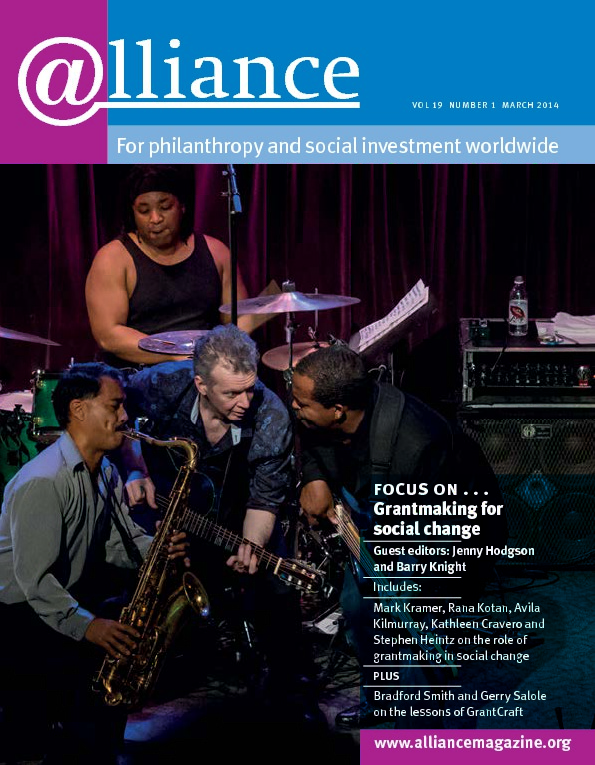Philanthropy in Brazil has yet to match the diversity of its culture and civil society. It has avoided an active political role and been limited in terms of its investment strategies. The corporate foundations that comprise the bulk of the country’s institutional philanthropy distrust civil society organizations (CSOs) and prefer to operate their own programmes. Yet, philanthropy has the potential to be a game-changer, in supporting innovative groups dedicated to shifting the public debate, engaging people in public causes, and supporting CSOs capable of providing an institutional infrastructure for sustaining progressive causes.
The country faces great political challenges, largely pushed by street demonstrations, organized and not so organized groups, and CSOs. There is growing unrest in a context marked by large government income distribution programmes; uncertainty about the economy; poor public services, particularly in health, education and urban mobility; presidential elections coming up – and the World Cup.
A limiting approach to the possibilities of philanthropy can curb both its potential for innovation and its capacity for provoking effective transformations.
The newly emerged Brazilian philanthropic sector
Institutional philanthropy in Brazil – often referred to as private social investment – emerged as an organized sector in the 1990s, along with the movement for corporate social responsibility. In that decade following democratization, the non-profit sector almost tripled, the number of organizations reaching almost 270,000 associations and foundations in 2006. From 2006 to 2010, however, it grew only 9 per cent.
One significant aspect of Brazilian philanthropy is that most foundations are not endowed, often relying on revenues from services or annual contributions from the sponsor company or family. In Brazil, the same tax (on average 4 per cent, depending on the state) applies to bequests and charitable donations. This very low tax on inheritances constitutes an obstacle to charitable giving, something which has greatly contributed to an underdeveloped independent foundation sector.
Around 70 per cent of the organizations affiliated to GIFE, the national association of foundations, are corporate, and the remaining 30 per cent are distributed among family, independent and (very few) community organizations. This imbalance is reflected in a disproportionate focus on selected areas such as education, culture and the environment. Areas like human rights have attracted little attention from most private social investors, who often seek to align their social investments with their business areas or prefer those that are less controversial and more likely to contribute to their image and brand reputation.
In addition, over 70 per cent of all resources invested by GIFE’s members are in programmes they themselves operate, with less than 30 per cent donated to non-profits. Grantmaking is often seen as a less strategic and effective approach to social investment.
Philanthropy in Brazil is already shy of supporting civil society organizations and approaches like catalytic philanthropy, championed by Mark Kramer[1], provide a further argument to undermine a practice that has never been fully established in Brazil. The consequences for democracy and innovation in the social field may be dire.
Challenges in mobilizing private resources for civil society organizations
Civil society in Brazil, particularly human rights organizations, has been funded for the past 20 years largely by international foundations and cooperation agencies from Europe and North America. With the recent changes in priorities for these funders, many CSOs have turned to other potential sources of funding: government, the private sector and individual donors.
There are many challenges for organizations in raising funds from private donors in Brazil. Perhaps the most crucial is that most social investors are linked to corporations, which imposes a set of additional obstacles:
- Negative perceptions of the capacity of CSOs to carry out their missions. CSOs are often seen as having little capability to affect the issues they address. Companies prefer to develop and operate their own programmes. When CSOs are able to establish partnerships with companies or corporate foundations, they often operate as service providers, rarely as grantees.
- Willingness to be directly accountable for the impact of their work. Both corporate and independent foundations are increasingly focusing their strategy on selected issues, developing strong monitoring and measuring systems – even though the challenges in this area are significant – so as to be able to demonstrate the impact of their work.
- Need to demonstrate the value to the business. Supporting CSOs is often seen as a diversion from their core business (as social investors), with grantmaking dismissed as just ‘writing the cheque’. Corporate foundations are expected to generate value for the business, which has led them to operate more closely to business areas – and further away from grantseekers.
- Development of the impact investing industry. A more recent trend is emerging in Brazil: the growth of social businesses and the ecosystem surrounding them. While it brings promising solutions to some social problems, particularly those capable of being addressed by the provision of services, it also potentially deprives already-starved CSOs of resources. As this development is at an early stage, however, it is too soon to predict its impact.
In general, even independent foundations with a grantmaking portfolio are keen to play a more active role in the areas in which they operate. They feel they can contribute more with their influence, and their capacity to bring together public and private actors, insights and management skills, than just providing financial resources. The problem is that these additional contributions often come with a decrease in financial assistance, without a clear strategy as to how the organizations they work with will develop a sound funding base. It may well be true that social investors have a lot more to contribute than financial resources, but if everyone is willing to be a partner, who will be a funder?
Developing a vibrant and autonomous civil society
Innovation is often the result of diverse thinking and of bridging different approaches to seek common solutions to a problem. It addition to requiring innovative thinking, it requires resources.
Social problems, in general, can be addressed by different strategies. Actors are often unaware or uncertain of the most promising or effective solutions. Most approaches are new and experimental and their evaluation is frequently complex and resource-intensive. As if this was not enough, the contexts in which they operate are rapidly changing because of changes in the direction of public policies or variations in the economic, political and regulatory environment.
As a funder or grantmaker, one may identify many different actors operating in a certain environment, addressing the same social issue with diverse, and often contradictory, approaches. This diversity is part of the potential of civil society. Private social investors should take advantage of their flexibility and freedom – compared to governments – to take risks in supporting social groups in realizing their missions.
If it is true that the institutional capacity of many CSOs in Brazil is fragile, it is both cause and consequence of the lack of funding. It reinforces the general perception of their inefficiency and undermines the potential of experimenting and developing new approaches. In addition, the lack of support from private donors pushes organizations to seek government resources, leading to an entangled net of bureaucracy and clientelism.
Another frontier to be explored within philanthropy in Brazil is individual giving. While it brings enormous potential for supporting social groups and strengthening legitimacy and accountability in the social sector, both regulatory and cultural challenges remain significant obstacles to be overcome.
The idea that foundations themselves, or social investors, are better positioned to directly address social problems fails to consider the political dimensions of dealing with social issues. It is not just a matter of providing efficient services or effectively implementing an investment strategy, but also of providing conditions for the engagement of social groups in the political sphere. While it may sound idealistic or naive, recent events in Brazil have empirically demonstrated the consequences of the lack of political channels for participation and weakened civil society infrastructure.
In order for social investors to accomplish their potential in supporting civil society infrastructure and driving social change in Brazil, they have to broaden their perspectives on the strategies at their disposal. Restrictive approaches and customized solutions may lead the philanthropic sector in Brazil to a dead end. And we need exactly the opposite right now.
1 See http://www.ssireview.org/articles/entry/catalytic_philanthropy
Andre Degenszajn is secretary general of GIFE. Email andre@gife.org.br






Comments (0)